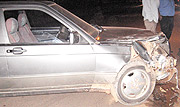The Ministry of Infrastructure will launch the first ever “designated driver” campaign over the summer months to help curb accidents due to drunk driving. The media campaign will feature radio advertisements asking Rwandans to volunteer to stay sober if they are going out with friends who plan to consume alcohol.


The Ministry of Infrastructure will launch the first ever "designated driver” campaign over the summer months to help curb accidents due to drunk driving. The media campaign will feature radio advertisements asking Rwandans to volunteer to stay sober if they are going out with friends who plan to consume alcohol.
The volunteer or "designated driver” should ensure that their friends have a safe ride home. The advertisements will air primarily on the weekends when most people are out drinking.
"Designated driver” campaigns are quite common in many North American and European countries.
Dominique Rurangirwa, who works in transportation and road safety for the Ministry said that drunk driving is one the biggest problems on Rwanda’s roads and that raising awareness is the most important step in reducing accidents.
"We want to sensitise the population, let them know that the police will be patrolling the roads, so that they will be careful with alcohol when they are driving,” he said.
Past awareness campaigns have focused on other road safety issues such as respecting speed limits and pedestrian crossings, and were primarily broadcast during the holiday season, when there are more young drivers on the road.
But the Ministry will start the new drunk driving campaign early in an attempt to decrease the number of accidents this year. It is hoping to reduce accidents by at least 15 per cent in accordance with a target set by the World Health Organization.
According to the Ministry, in 2007, drunk driving was responsible for 122 collisions or only about 5 per cent of the total number accidents across the country.
But Rurangirwa readily admits that the number is probably much higher as alcohol is often a factor in collisions that are classified as caused by speeding or inattention.
Public awareness campaigns are only one step in the government’s attempts to stop drunk driving, an effort that is relatively young. The law prohibiting drunk driving was passed in 1987, but only began to be routinely enforced in 2002.
"After the war, we started to see the roads, just how dangerous they were,” said Rurangirwa who has worked in traffic safety for over a decade.
"We had enough death in the Genocide, we didn’t need more dying on the roads.”
The World Bank helped finance a new road safety program, which included increased police patrols and the purchase of breathalysers, commonly known as alcotets, which are hand-held devices that indirectly measure a person’s blood alcohol content (BAC).
The 1987 law prohibits anyone from driving if their BAC is over 0.8 grams per liter or 0.08 grams per 100 milliliters. Ismael Baguma, the head of accident management for the Rwandan traffic police, said over the past few years the police have started to control drunk driving by placing checkpoints across the city.
"People here tend to drink and then want to go from pub to pub. They end up drinking the whole night,” he said.
According to Baguma, on any given weekend from about 10 p.m. to 6 a.m. there between eight and 12 checkpoints across Kigali, staffed by five officers.
Under a police escort, Sunday Times observed a checkpoint near Gishushu on Friday night. Police officers pulled over vehicles, seemingly at random, and requested their driver’s permit.
The police then performed breathalysers on some of the drivers; particularly those who they said seemed intoxicated.
When asked, most drivers at the checkpoint agreed that drunk driving is a major problem in Kigali and supported the efforts of the traffic police.
"Drinking and driving is a grave mistake. You may cause an accident, hurt another person or hurt yourself,” said Elies Munyambabali after a police officer in a bright green coat checked his driver’s permit and vehicle registration. Driver Remy Hategekimana agreed.
"If you drink too much and then drive it’s very dangerous,” he said after he passed the breathalyser test with zero BAC.
The damaging result of drunk driving was visible at an accident scene only a few kilometers for the Gishushu checkpoint.
A man driving a black truck had slammed into a grey Mercedes Benz, smashing the right headlight beyond recognition. Shattered glass was strewn about the intersection.
Police officers on the scene said the man was drunk. No one was injured in the accident. In a one-hour period at the checkpoint, two drivers failed the breathalyser test and had their cars impounded.
They were each fined Frw50,000, which they must pay in order to get their vehicles back. One man, whose estimated BAC was significantly above the legal limit at 0.38 begged and pleaded with the senior officer on duty to give him back his car as it was loaded onto a tow truck. He said he was too distraught to provide a comment.
Ends


